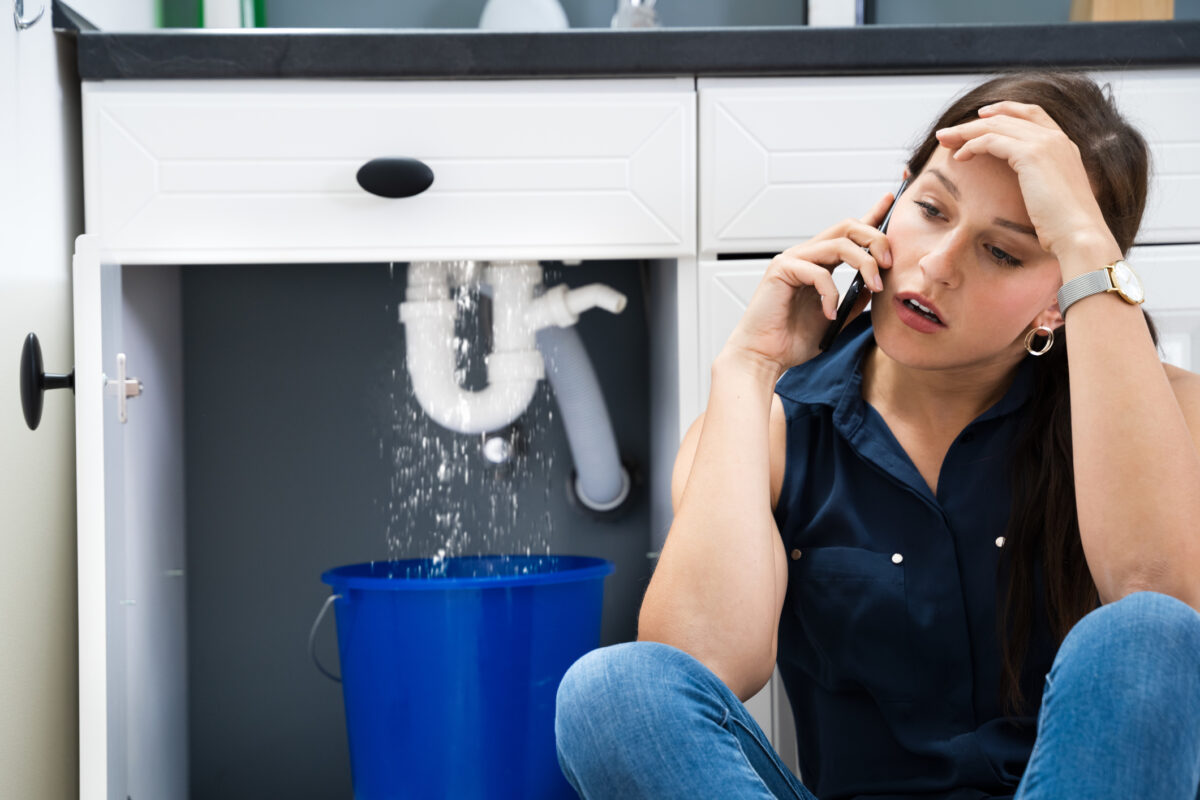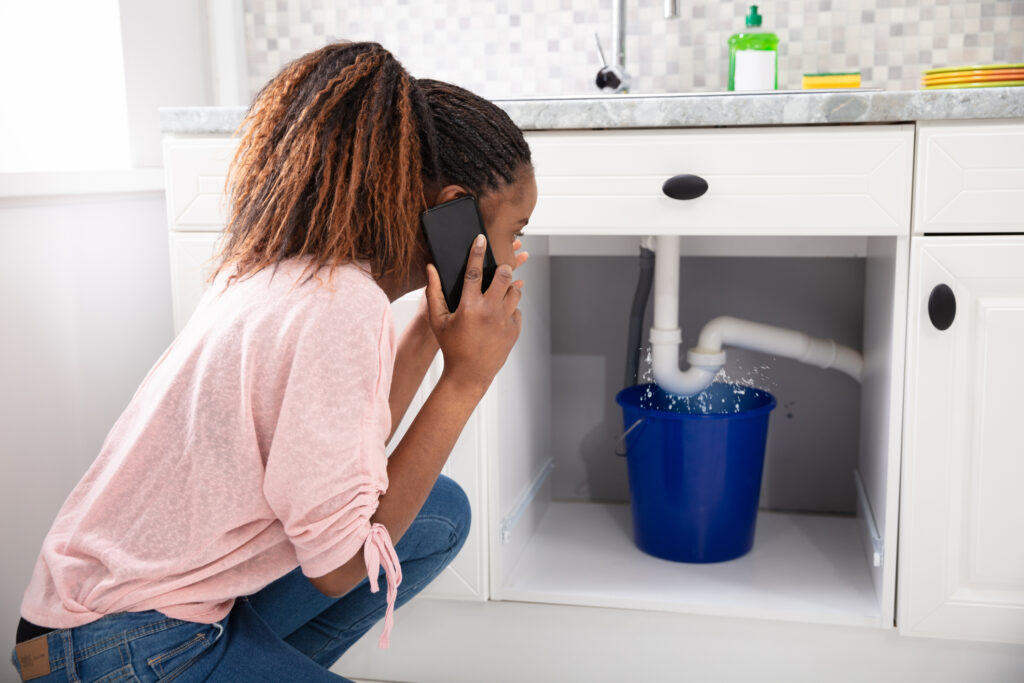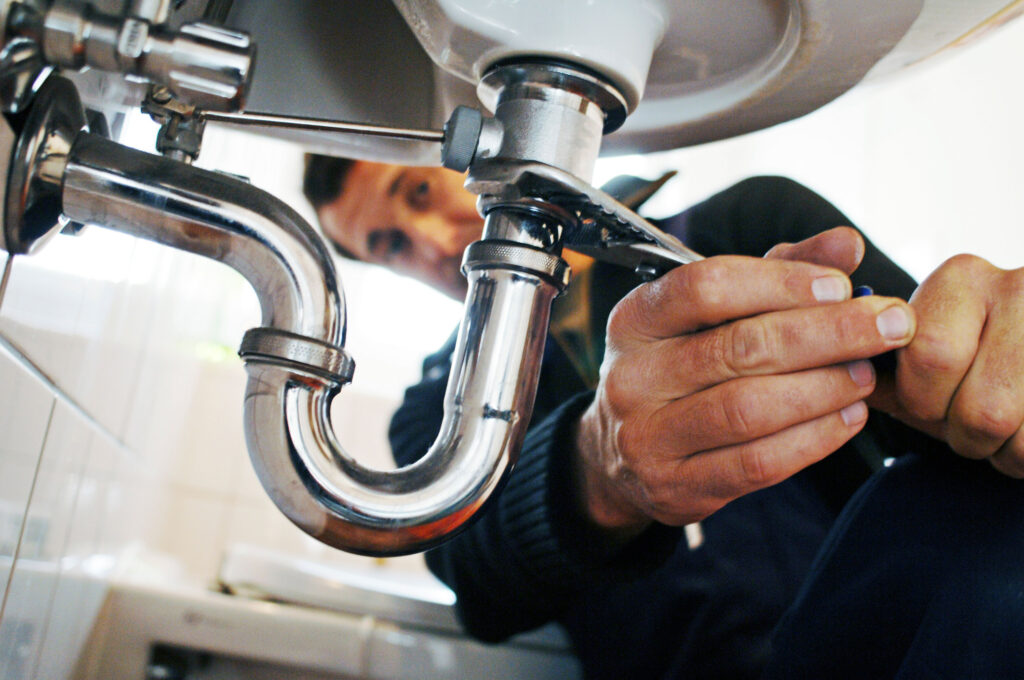How to Handle a Plumbing Emergency

A plumbing emergency, like a burst pipe or overflowing toilet, requires immediate attention to prevent serious damage to your home. First, stay calm and locate your main water shut-off valve to stop the water flow. Turn off electricity if water is near outlets, and use buckets or towels to contain leaks. For severe issues, call a professional plumber right away. Regular maintenance and knowing where your shut-off valves are can help prevent future emergencies and keep your home safe.

Photo from iStock – Credit: AndreyPopov
Plumbing Emergency – Ever had water gushing from a burst pipe or an overflowing toilet that just won’t quit? Plumbing emergencies can turn your day upside down in seconds, leaving you stressed and scrambling for a solution.
Whether you’re in Cincinnati, Norwood, or Finneytown, knowing how to handle these sudden plumbing problems can save your home from serious damage and keep your sanity intact.
In this guide, we’ll walk you through what counts as a plumbing emergency, the steps to take, and how to prevent future disasters. Let’s dive in!
What is a Plumbing Emergency?
A plumbing emergency is any situation involving your plumbing system that needs immediate attention to prevent severe damage to your home.
Think of situations like burst pipes, major leaks, or an overflowing toilet that just won’t stop. These issues, if not handled right away, can lead to water damage, mold growth, or even structural damage to your home.
So, what makes a plumbing problem an emergency? It all comes down to the potential for damage.
If water is pouring out uncontrollably or your toilet is overflowing into your bathroom, you’re dealing with a plumbing emergency. On the other hand, if it’s just a slow-draining sink or a minor leak, you might have a bit more time to address the issue.
Immediate Steps to Take During a Plumbing Emergency
When a plumbing emergency hits, it’s easy to feel overwhelmed. But don’t worry—you’ve got this! The key is to stay calm and take quick action to minimize damage until help arrives. Here are the immediate steps you should follow:
Stay Calm and Assess the Situation
First things first: take a deep breath. Panicking won’t help, but a clear mind will. Look around and figure out what’s going on.
Is water flooding from a burst pipe, or is the toilet overflowing? Identifying the problem helps you decide your next move. Remember, the faster you act, the less damage there will be, so stay focused and move on to the next step.
Shut Off the Water Supply
Once you know what’s happening, the next step is to stop the flow of water. Find your home’s main water shut-off valve and turn it off to stop water from making the mess worse.
If you’re not sure where it is, check places like the basement, garage, or outside near the street. For smaller issues, like a leaking toilet or sink, you can often find shut-off valves right under the fixture. Knowing where these valves are ahead of time can save you precious minutes.
Turn Off the Electricity if Necessary
If water is leaking near electrical outlets, appliances, or wires, it’s crucial to turn off your home’s electricity to avoid a potential shock. Head to your circuit breaker and switch off the power to the affected areas of your home.
Water and electricity are a dangerous mix, so don’t skip this step if there’s any chance of them meeting. It’s better to be safe than sorry, especially in these situations. Once the power is off, you can focus on containing the water.
Common Plumbing Emergencies and How to Handle Them
Plumbing emergencies come in all shapes and sizes, and knowing how to tackle them can make a huge difference. Here are some of the most common issues you might face and what you can do to manage them until a professional arrives.
Burst Pipes
A burst pipe can send water spraying everywhere, causing damage in minutes. If you notice a burst pipe, turn off the main water supply immediately to stop the flood. Open your faucets to drain the remaining water from the pipes and reduce pressure.
Next, try to contain the water with towels or buckets while waiting for help. It’s also a good idea to move any valuables or furniture away from the flooded area to prevent further damage.
Overflowing Toilet
An overflowing toilet can quickly turn into a messy nightmare. First, locate the shut-off valve near the base of the toilet and turn it off to stop the water flow. If you can’t find it, take the lid off the tank and lift the float to stop more water from entering the bowl.
Use a plunger to try and clear any blockages, but if that doesn’t work, call a plumber right away. In the meantime, mop up any spills to keep the water from seeping into your floors.
Major Leaks
Major leaks, like those from broken fixtures or damaged water lines, need immediate attention. Shut off the water supply to the affected area or the whole house if needed.
Use buckets, towels, or anything you can find to catch the leaking water and prevent it from spreading. Try to locate where the leak is coming from, as this can help the plumber when they arrive. Avoid using the affected plumbing fixtures until the issue is resolved.
Clogged Drains
Clogged drains are more than just an annoyance—they can lead to overflows and bad smells if left untreated. For minor clogs, a plunger or a drain snake can often do the trick.
Avoid using chemical drain cleaners, as they can damage your pipes if used too frequently. If you’re dealing with a severe blockage, it’s best to call a plumber. In the meantime, try to limit water usage in the affected area to prevent further problems.
Tools Every Homeowner Should Have for Emergencies
Having the right tools on hand can make a huge difference when a plumbing emergency strikes. While you might not be able to fix everything yourself, these tools can help you control the situation until a professional arrives.
Basic Plumbing Tools
Every homeowner should have a few basic plumbing tools ready to go. A plunger is a must-have for dealing with clogged toilets and drains. A pipe wrench can help tighten loose fittings, while a set of adjustable pliers is useful for a variety of quick fixes.
A drain snake or auger can help tackle stubborn clogs that a plunger can’t handle. Lastly, having a screwdriver set is handy for small adjustments and repairs around your plumbing fixtures.
Emergency Supplies
Beyond tools, some emergency supplies can be lifesavers during a plumbing crisis. Keep a bucket and some old towels nearby to quickly soak up spills and leaks. Waterproof tape or pipe sealant tape can provide a temporary fix for minor leaks until a plumber can make it out.
A flashlight is essential for spotting leaks in dark or hard-to-reach places. Also, a wet/dry vacuum can be invaluable for cleaning up water quickly and preventing further damage to your home.
Preventing Future Plumbing Emergencies
While you can’t predict every plumbing emergency, taking a few proactive steps can help you avoid the most common issues. A little bit of maintenance and awareness goes a long way in keeping your home’s plumbing in good shape.
Regular Maintenance
Regular maintenance is key to preventing plumbing problems. Here are some simple steps you can take to keep your plumbing system in good shape:
- Check for Leaks: Periodically inspect areas under sinks, around toilets, and near appliances for any signs of leaks. Catching leaks early can prevent water damage and mold growth.
- Clean Your Drains: Regularly clean your drains to prevent buildup that could lead to clogs. Avoid pouring grease, food scraps, or other debris down the drain, as these can cause blockages over time.
- Inspect Fixtures: Keep an eye on your faucets, showerheads, and other fixtures for any signs of wear or corrosion. Replacing worn-out parts can help avoid leaks and maintain water pressure.
- Schedule Professional Inspections: Consider scheduling a professional inspection of your plumbing system at least once a year. These inspections can catch small issues, like minor leaks or corrosion, before they become major problems.
- Replace Aging Components: Pay attention to the age of your plumbing components, such as pipes, water heaters, and valves. Replacing aging parts before they fail can save you from unexpected emergencies and costly repairs down the line.
Taking these regular maintenance steps can help extend the life of your plumbing system and save you time and money in the long run.
Know Your Plumbing System
Understanding your home’s plumbing system can save you a lot of hassle during an emergency. Take the time to learn where your main water shut-off valve is located, as well as individual shut-off valves for sinks, toilets, and appliances.
Know where your pipes run through the house, so you can quickly identify potential problem areas. The more familiar you are with your system, the faster you can act when something goes wrong.
Avoid Common Mistakes
Some plumbing issues can be avoided by steering clear of common mistakes. Don’t pour grease or oil down your drains, as they can harden and cause clogs. Avoid flushing anything other than toilet paper and human waste to keep your pipes clear.
Be mindful of what goes into your garbage disposal—fibrous foods, coffee grounds, and large scraps can all cause problems. By being careful with your plumbing, you can reduce the risk of emergencies.
When to Call a Professional Plumber
Not every plumbing issue can be tackled with a plunger and some DIY spirit. Knowing when to call a professional plumber can save you from turning a small problem into a major disaster. Here are some situations where it’s best to bring in the pros.
Recognizing When You Can’t Fix It Yourself
It’s important to recognize when a plumbing problem is beyond your ability to fix. If you’ve tried basic troubleshooting and the issue persists, it’s time to call a plumber.
For example, if you’ve plunged your toilet multiple times and it’s still clogged, or if a leaky pipe continues to drip after you’ve tightened it, you need professional help. Don’t wait too long—what starts as a minor inconvenience can quickly become a much bigger and more expensive problem.
Major Water Leaks
Major water leaks, like those from burst pipes or broken water heaters, require immediate professional attention. If you notice water pooling around your home or hear the sound of running water when no taps are on, you’re likely dealing with a significant leak.
Shut off your water supply and call a plumber right away to prevent serious water damage. Remember, the longer you wait, the worse the damage can get.
No Access to Shut-off Valves
If you can’t locate or access your shut-off valves during a plumbing emergency, it’s crucial to call a plumber immediately. Shut-off valves are essential for stopping water flow in an emergency, but sometimes they’re hidden, stuck, or difficult to reach.
A professional plumber can quickly shut off the water to prevent flooding and assess the problem without causing additional damage.
Persistent or Recurring Problems
When plumbing problems keep coming back, it’s usually a sign of a deeper issue that needs professional diagnosis. Recurring clogs, frequent leaks, or constantly running toilets indicate that there’s more going on than meets the eye.
A plumber has the tools and expertise to find the root cause and fix it properly, saving you from repeated headaches and temporary fixes.
How to Choose an Emergency Plumber
Choosing the right emergency plumber is crucial during a crisis. Look for someone local with good reviews and a track record of reliable service in your area. Make sure they offer 24/7 availability, so you’re covered no matter when an emergency strikes.
It’s also wise to ask about pricing upfront, so there are no surprises later. Keep the contact information for a trusted plumber handy, so you’re prepared when an emergency arises.

Photo from iStock – Credit: Wirestock
What to Expect When the Plumber Arrives
When a plumber arrives at your home during an emergency, it’s normal to feel anxious about what comes next. Knowing what to expect can help ease your worries and ensure a smooth process. Here’s what typically happens:
- Initial Assessment: The plumber will inspect the problem area and identify the source of the issue. They may ask you questions about the problem’s history and any steps you’ve taken so far to help them get a full understanding.
- Discussion of Solutions: After assessing the situation, the plumber will explain their findings and outline potential solutions. They’ll provide an estimate of the cost and time required for the repairs. Don’t hesitate to ask questions if you need clarification—clear communication is important.
- Repair Process: Once you agree on the plan, the plumber will start fixing the issue. Depending on the severity, the repair could be a quick fix or might take more time. The plumber should keep you updated throughout the process, especially if any unexpected issues arise.
- Testing and Final Checks: After completing the repairs, the plumber will test the system to ensure everything is working correctly. They will also give you tips on how to prevent similar issues in the future.
By knowing what to expect, you can stay calm and confident, ensuring your plumbing emergency is handled smoothly and efficiently.
Don’t Let a Plumbing Emergency Ruin Your Day!
When a plumbing emergency strikes in Cincinnati, Norwood, or Finneytown, you need reliable help fast. Whether it’s a burst pipe, an overflowing toilet, or a major leak, a plumbing emergency can cause significant damage if not addressed immediately.
At Halpin Plumbing, our expert team is ready to tackle any plumbing emergency, big or small, with prompt and professional service.
FAQs About Plumbing Emergency
What Should I Do First in a Plumbing Emergency?
First, stay calm and assess the situation to determine the source of the problem. Then, turn off the main water supply to prevent further damage. If water is near any electrical outlets, switch off the electricity to the affected area as well. Quick action can significantly minimize the impact of a plumbing emergency.
How Can I Prevent My Pipes from Bursting?
To prevent pipes from bursting and causing a plumbing emergency, especially during cold weather, keep your home’s temperature above freezing and insulate exposed pipes. Let faucets drip slightly during extremely cold temperatures to keep water moving and reduce pressure buildup. This small step can help you avoid a costly plumbing emergency.
Are All Plumbing Problems Emergencies?
Not all plumbing problems are emergencies. Minor leaks, slow drains, and small clogs can often wait for regular business hours. However, major leaks, burst pipes, or anything causing flooding should be treated as a plumbing emergency and addressed immediately.
Is It Safe to Use Chemical Drain Cleaners?
While chemical drain cleaners can sometimes clear clogs, they can also damage your pipes, especially if used frequently. They are often not effective for severe blockages and can cause more harm than good.
When Should I Call a Professional Plumber?
You should call a professional plumber when you’re dealing with major leaks, burst pipes, overflowing toilets, or any issue you can’t fix on your own. If you’re unsure, it’s always safer to consult a plumber to avoid making the problem worse, particularly during a plumbing emergency.